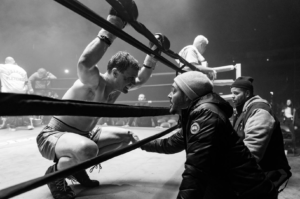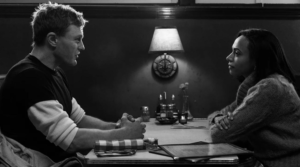What would you do if you only had one day to make it right with the people who mattered to you most because you know you might not have a tomorrow? That is the question Jack Huston’s brilliant directorial debut asks of Mikey Flanagan, a boxer with a painful past and maybe just one more fight left in him.
It is important to note that Day of the Fight is not a “boxing movie” but a movie about a boxer. The distinction is meaningful. Boxing is what Mikey does, and at one time, he may have thought that a boxer was all he was. Not anymore.
On the day that Mikey, a former champion, is given a high-profile fight after spending years in prison for causing the death of a child while driving drunk, Day of the Fight is more concerned with Mikey’s efforts to make amends than it is about the fight itself. I would go so far as to argue that if the fight never took place, the film would be complete.
The grace notes in Day of the Fight are not so different than those of Darren Aronofsky’s The Wrestler. Mikey (just like Mickey Rourke’s Randy the Ram) has made many mistakes in his life. He has burned bridges and broken hearts (including his own), and after ten years away from the fight game, he’s been gone too long (or has he?). There are those who haven’t forgotten Mikey, and Mikey makes the rounds to those few left in his corner.

Mikey is played by the gifted actor Michael Pitt, who, again, like Rourke, his director had to fight for him. Jack Huston and Michael Pitt forged a bond on the set of Boardwalk Empire as young actors, and Huston wrote the film with Pitt in mind. Financing was hard to come by with Pitt as the chosen lead, but Huston (like Aronofsky) told those who would bankroll his film that it was Pitt or no one. And the infamous “they” bent.
As a younger man, Pitt was a true up-and-comer. However, he was often seen as difficult to work with. He sometimes got in his own way. Had he become a star, his issues might have been seen as eccentricities. Since he didn’t, he became a talented actor that studios and filmmakers didn’t want to deal with.
Huston’s bet on Pitt pays off like gangbusters. The wounded soul inside of Pitt mirrors that of MIkey’s. There is not a single second of the film in which you don’t believe in Pitt’s every word and gesture. Whether feeding his cat, tipping a coffee shop worker $300, or placing a fool’s bet on himself to win the fight.
The film, shot by cinematographer Peter Simonite in silvery black and white, is simultaneously lustrous and gritty. The score by Huston’s brother-in-law, (first-time composer) Ben MacDiarmid, is elegant and, when necessary, a driving force in the film. Despite being made on a low budget, the film looks and sounds fantastic.
Huston sure can pick ‘em when it comes to casting. He gets Steve Buscemi for a single scene, and Joe Pesci (who also co-produced the film and sings two songs on the soundtrack) came out of retirement for just two scenes. It’s the first time we’ve seen Pesci on screen since The Irishman, and in one of those scenes, Pesci doesn’t speak a word, and I’ll be damned if he doesn’t break your heart in a devastating display of human frailty. John Magaro, who, with this film and September 5, is having a hell of a year, plays a priest with whom Mikey has been friends since they were both children. Magaro’s Father Patrick, takes Mikey’s confession, and the script (written by Huston) gives the two men wonderful words of regret and bittersweetness. Pitt and Magaro rise to the occasion, and when Mikey leaves the church, he pauses and looks back at his old friend, the way one does when they don’t know if they will ever see that person again. It’s just a slight pause, but it takes your breath away.
Ron Perlman plays Mikey’s longtime trainer, Stevie. If anyone was ever meant to play an aging, crusty, but still formidable boxing lifer, it’s Perlman. Pitt and Perlman have less than a handful of scenes together, but they create a whole lifetime in those brief sequences. They are trainer and fighter, and their relationship is unshakable.

Mikey also meets up with his ex-wife, Jessica (a stunning Nicolette Robinson), and they go for a walk. They carry more than the weight of a broken marriage; they also share a daughter, who Jessica understandably doesn’t allow Mikey to see. They rehash the issues of their marriage, but as Mikey loudly and comically begs Jessica to let him buy her lunch, her defenses weaken. What is broken between them can’t be put back together, yet the love of what once was and the life they created remains.
Jessica is a nightclub performer at a joint that is beneath her talent level. She plays piano and sings. Without giving too much away, let me say that should you see Day of the Fight, you will never hear Creedence Clearwater Revival’s “Have You Ever Seen the Rain” the same way again. I know I won’t.
All these sequences could have played out in episodic fashion, but Huston’s sure hands, the gorgeous score, the beautiful lensing, and the perfectly pitched performances all add up to an authentic and remarkable whole.
Still, the film belongs to Michael Pitt. There is a moment in the movie where Pitt’s Mikey visits a gravesite. As he kneels in front of it, his words are unintelligible. They are not for the audience but for the character and the stone erected in front of him. The power of Day of the Fight can often be found in the in-between. The glances and movements of the characters as they go about this very unusual day that only one of them knows the full importance of. Pitt is in every scene. The movie rests upon his back. The weight of the film is as heavy as a sixty-pound stone. Pitt carries that burden more than admirably. He gives one of the performances of the year, and I would go so far as to say the performance of his lifetime.
Day of the Fight does include the actual bout—a grueling 12-round contest that takes from Mikey all that he has left but also sees him give everything he has. After the fight, Mikey returns to his run-down apartment. In a film with few special effects, he walks down the corridor of his home, and the walls become papered with Mikey’s best memories. Those walls are a message.
As he lies in his bed, all of the guilt and pain seem to leave Mikey’s body, leaving only a form of purity. A purity won in the hardest of fashions. Mikey has completed his mission, not only in the ring but in life. He has become the best version of himself before it’s too late.
Jack Huston comes from cinematic royalty. His father, Tony, is a talented screenwriter. His uncle is the powerful actor Danny. His aunt is the legendary Angelica. His great-grandfather is the prolific character actor Walter. His granddad is John, one of the greatest directors in film history.
John Huston once made a film about a boxer called Fat City, starring Stacey Keach and Jeff Bridges. Fat City is one of the finest films ever made about a down-on-his-luck pugilist. Jack Huston’s Day of the Fight can stand proudly next to his granddad’s classic. It’s not only one of the best films of the year, it’s also my favorite.
There’s a scene late in the film where Mikey comes across a young girl standing outside in the cold of New York City without a proper coat. Mikey takes off his jacket and gives it to her. Mikey isn’t lending her the coat; he’s giving it away. He’s giving it all away. Day of the Fight gives it all away, too. It gives you everything. All in one day.
The film opens in New York City and Los Angeles on December 6. Martin Scorsese hosted a special preview in November because he loves and believes in Day of the Fight so much.
I understand that love and belief. Between the Day of the Fight’s theatrical release and future streaming availability, the film will soon belong to all who see it.
Be one of those people. You won’t regret it.
I want to give a special thanks to the Virginia Film Festival, whose team made it possible for me to see this film and interview Jack Huston.











Thanks for showcasing this extraordinary film, David. It sucker punched me, a few times! And Pitt delivers one of the year's finest performances.
Agree on all counts.